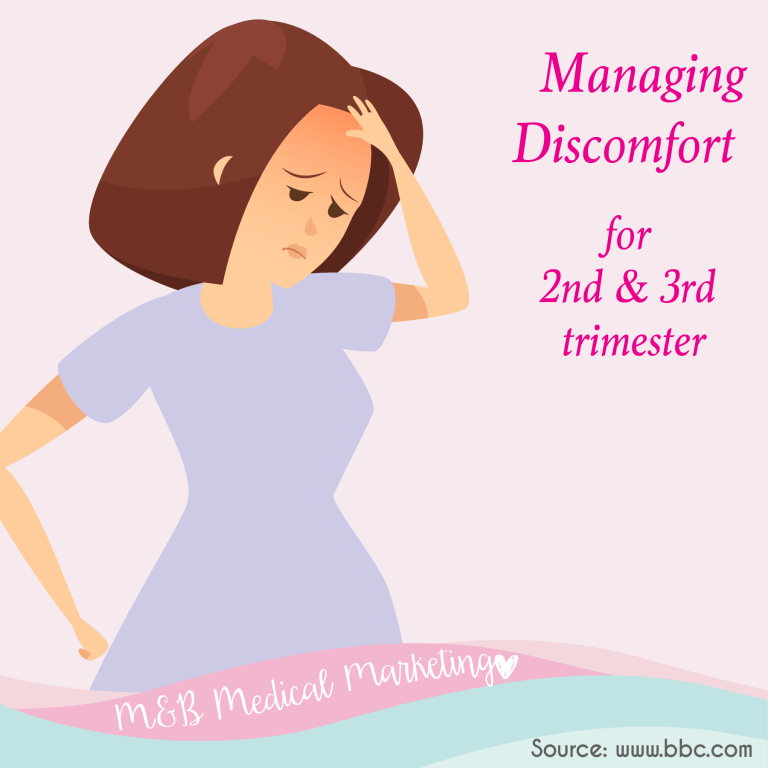POSITIVELY PREGNANT
MANAGING DISCOMFORTS
IN THE 2ND & 3RD
TRIMESTER

Second trimester tips
These hints may help relieve some minor complaints in the second trimester:
To limit ankle swelling, sit with your feet raised.
For leg cramps, wear support hose. Get enough exercise and wear shoes with flexible soles. Increase your calcium intake.
To avoid sore feet, don’t stand in one position for too long. Don’t lock your knees. Don’t wear high heels.
If you have pain in your groin and abdomen (round ligament pain), avoid sudden twisting movements. Ask your healthcare provider if an abdomen support device may be helpful.
Managing discomforts in the 3rd trimester
The discomforts that follow are most common during the third trimester, but they can occur at any point throughout the nine months. The tips below may help. But at times, getting comfortable will not be easy. In some cases, you may just have to make the best of it. Remind yourself that you won’t be pregnant much longer!
Reducing heartburn
The hormones produced during pregnancy cause the muscles in the digestive tract to relax. Because of this, your food digests more slowly. Also, the growing baby presses on the digestive tract. Heartburn results.
Eat small, light meals throughout the day, rather than three large ones.
Eat slowly.
Sleep with your upper body raised 15 cm. Don’t lie down until two hours after you eat.
Treating constipation
You may be constipated because the muscles of your bowels are more relaxed. Also, as the uterus grows, it puts pressure on the bowels.
Eat foods high in fibre (whole-grain foods, fresh fruit and vegetables).
Drink plenty of water.
Get regular exercise.
Taking care of your breasts
Your breasts may increase in size and be more sensitive and tender. You may leak colostrum (yellowish early milk) as your due date nears.
Avoid using harsh soaps or alcohol, which can cause excessive dryness.
Wear nursing bras. They provide more support than regular bras and can be used after pregnancy if you breastfeed.
Getting a good night’s sleep
Getting restful sleep can be a challenge in late pregnancy.
• Take a warm shower before bed.
• Sleep on a firm mattress.
• Lie on your left side with one leg crossed over the other.
• Place pillows under your stomach and back and between your knees.
Easing back pain
Practise good posture
Try to align your ears, shoulders and hips. Pull in your abdomen to support your lower back. Keep your pelvis level to help brace your back. Think of the pelvis as a bowl of water that will spill if it tips too far forward.
Think before you lift
Bend at the knees to bring the load nearer. Get a good grip and test the weight. Tighten your abdomen. Lift with your leg muscles, not with a bent back.
Exercise
Exercises help to ease back pain.
A note to fathers
You may feel removed or even a little left out of the pregnancy. But there are ways you can share this experience:
Spend time just being close with your partner. Massage her back and feet.
Talk or sing to the growing baby. Feel for the baby’s kicks.
Go to childbirth classes with her. Being informed will help you understand what your partner is feeling as the birth nears.
Share your partner’s healthy lifestyle. Eat right and exercise with her. With your support she can take better care of herself.
Limiting vein problems
Swollen veins may occur in the legs, rectum or vulva. They are caused by an increase in blood volume and pressure on the pelvic and leg veins. Swelling of the veins of the rectum (haemorrhoids) is worsened by constipation.
Get regular exercise, such as a daily walk.
Wear support pantyhose or stockings from the time you get up until you go to bed.
Avoid snug shoes and clothes that bind.
Eat plenty of fibre and drink enough fluids.
Don’t stand or sit for long periods.
Dealing with frequent urination
You may find that you need to urinate more often. At first, this is because you have more body fluids and your kidneys are removing excess fluid. Later, it is caused by pressure of the enlarged uterus on your bladder as the baby grows.
• Be aware that the more fluids you drink late in the day, the more you may need to urinate at night. Try to drink most of your fluids earlier in the day.
Caring for bleeding gums
Hormonal changes during pregnancy can make your teeth more susceptible to plaque build-up, which then triggers bleeding gums.
Clean your teeth twice a day for two minutes.
Choose a toothbrush with soft, slim bristles.
Avoid sugary or acidic foods and drinks.
Visit your dentist regularly.
Source: MIMS HealthToday Malaysia
